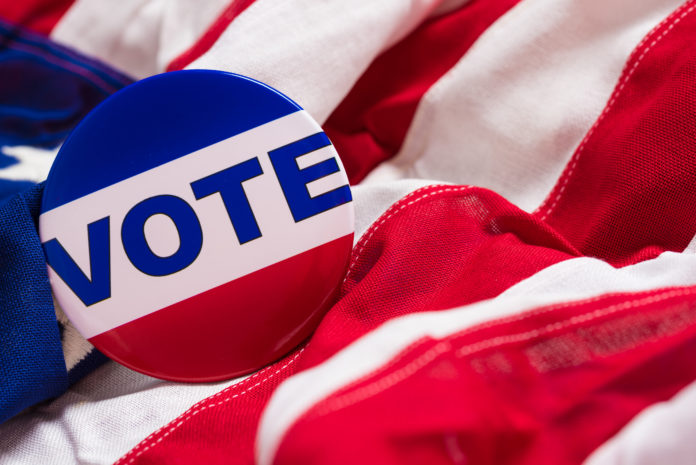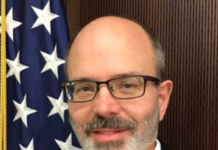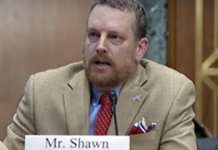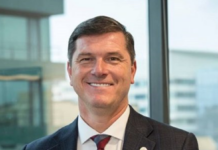In what may be a first for Kansas, a federal political action committee is targeting local school board races in an effort to elect candidates who oppose critical race theory.
The 1776 Project PAC is backing 50 candidates in seven states, including Kansas, New Jersey, Pennsylvania, Virginia Ohio, Minnesota and Colorado.
The group is supporting 13 candidates in Kansas, more than any other state on its national campaign agenda.
The 1776 Project PAC is supporting school board candidates who oppose teaching critical race theory or anything about the 1619 Project, a New York Times initiative detailing the history of slavery and the role it played in shaping the country.
The group is raising eyebrows among public education advocates who say it’s bringing a “thinly-veiled racist agenda” to Kansas school board races.
The group is headed by New York political operative and author Ryan Girdusky, who chaired the Free Forever PAC that played a big role in the 2020 U.S. Senate race.
The Free Forever PAC spent about $2 million unsuccessfully trying to get former Secretary of State Kris Kobach elected to the U.S. Senate last year.
The PAC’s largest contributor was PayPal founder Peter Thiel, who funneled about $2 million into the Kansas Senate race.
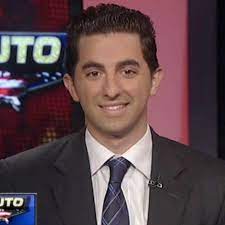
In an interview, Girdusky said Kansas was a good place to focus his efforts given the state has so many school board races on the ballot in an off-year election.
“Kansas is unique because it has a lot of major elections, but no real statewide elections,” Girdusky said.
“Kansas provides an interesting opportunity of having really the school board being the major issue on the ballot,” he said. “It’s a good way of gauging the issue overall.”
Girdusky said the Kansas City suburbs, where it’s endorsed 10 candidates, offer an opportunity to see how critical race theory plays with voters.
“It’s a way to really speak to this issue to people who may have voted for Joe Biden – or not voted at all even – and are concerned with their children’s education,” he said.
“I think education is a really important issue that touches across the board on the spectrum,” he said.
The group says that “critical race theory is a radical belief that pushes the idea that America is an inherently racist country and white Americans are stained with the original sin of racism for which they can never be cleansed.”
The group has endorsed three candidates running for the Lansing School Board, three running in Olathe, three running in Blue Valley, three in Andover and one in the Shawnee Mission School District.
Girdusky said this is the first time a federal PAC has been involved in local school board elections, something that observers in Kansas say they haven’t seen before.
“It’s literally never been done before. This is the first of its kind,” he said.
The group reported raising about $148,000 so far this year, federal campaign finance records show. It received one contribution from Kansas, a $525 donation from John Wolhgemuth in Auburn.
It has raised $8,250 from California, $7,750 from Texas, $5,250 from Alabama, $4,250 from Virginia and $4,110 from Florida.
Girdusky said he wasn’t sure how the money would be spent or what kinds of communications platforms would be used for the campaign.
Girdusky’s PAC could be spread somewhat thin with about $150,000 to spend so far on 50 races across the country.
However, Girdusky said he would likely spend money on slates of candidates who are running for office, which would conserve money.
“We’re backing slates,” he said. “We want to take over the entire school board. We don’t want to take over just one or two seats.”
There are no limits on campaign contributions to school board candidates in Kansas except for Wichita, which is large enough to fall under the purview of the State Ethics Commission.
The FEC recently sent the PAC a letter at the end of August, warning that there wasn’t enough information provided about employment of the donors.
In some cases, the phrase “best efforts” to identify the donor’s occupation or employer was listed on the report, but the FEC said that wasn’t sufficient.
“You must demonstrate that ‘best efforts’ have been used to obtain the information.
“To establish ‘best efforts,’ you must provide the commission with a detailed description of your procedures for requesting the information,” the letter said.
Girdusky referred questions about the FEC letter to his treasurer but said he was confident it was a “small compliance thing” where the donation was probably submitted without the employer or occupation information.
Originating in the 1970s, critical race theory became a framework used in university-level courses to help law school students understand how racism affected the legal system.
Later, it was used in some universities for students wanting to become school administrators and teachers to understand inequities in education.
State and local school officials have emphasized that critical race theory is not part of state academic standards and is not part of the education curriculum.
The 1776 Project PAC is just one of a number of groups opposing the teaching of critical race theory in schools.
The nonprofit Free to Learn Coalition earlier this year purchased $1 million in ads opposing critical race theory in New York City, Arizona and Virginia.
There are other groups that have formed to not only oppose critical race theory but mask mandates as well, including Parents Against Critical Race Theory, Oregonians for Liberty in Education, Educators for Quality and Equality in California and the national Parents Defending Education.
Similarly, conservative groups are becoming increasingly involved in local school board races, whether it’s Patriots for Delaware endorsing pro-school-reopening candidates or Pennsylvania parents starting a PAC to support school board candidates running to keep kids in the classroom.
While the 1776 Project PAC was formed months ago, it started to get attention in Johnson County over the weekend when the group’s endorsements started to circulate more widely on Twitter.
The endorsements immediately drew blowback from some public education advocates who don’t want to see the outside group involved in local school board races.

“If this is outside Kansas money coming in to influence local school board races, that’s something we haven’t seen in the past and we don’t want,” said Judith Deedy, executive director for Game On for Kansas Schools, a public education advocacy group.
Deedy called the PAC’s campaign an “unwelcome intrusion” into school board races because it’s a backlash against portraying history accurately even if it’s unflattering.
Stand Up Blue Valley, another public education advocacy group, also ripped into the group’s involvement in Kansas school board races.
“This is yet another example of an ongoing battle with hostile outsiders,” the group said in a Facebook Post from Monday night.
“No PAC from New York should have ANY say in our kids’ education. We’re sure the vast majority of Blue Valley parents would agree.
“Dog-whistles, disinformation, and racist innuendo are not welcome here.”
The posting drew 20 comments, including one from former Kansas House candidate Sally Jercha who reacted bluntly on Facebook.
“Just gross. Let’s send these three packing in November,” Jercha said of the three Blue Valley candidates endorsed by the 1776 Project PAC.
Jim McMullen, a conservative running for the Blue Valley School Board, received an endorsement from the group.

He flatly rejected Stand Up Blue Valley’s statement in its Facebook post that the group has a “thinly-veiled racist agenda.”
“It’s like the intellectually weak argument that liberals make whenever they think there’s some advantage to be had,” McMullen said. “I dismiss it completely.”
On his campaign website, he said terms such as “critical race theory” or “critical gender theory” are ideas that deny individualism and universal truth.
“I don’t seek to ban these ideas. I seek to expose them for their emptiness. I seek to promote classical liberalism that embraces intellectual inquiry, diversity of thought, and rational debate,” he wrote on his website.
Brian Neilson, who is running for a seat on the Shawnee Mission School Board, said he has had no communications with the 1776 group.
“I don’t know what their plans are,” he said. “I know who they are. I’m fine with their endorsement.”
Neilson said he has not received any money from the group.
He added, “If someone tries to paint me as a racist, that charge may stick to me in the eyes of some, but I don’t care. It’s know it’s 100% not true.
“I was an anti-racist before it was fashionable,” he said.
Neilson is running against incumbent Shawnee Mission School Board President Heather Ousley.
Ousley said she sees the group’s efforts as one more attack on public schools with a false narrative.
“It seems to be propaganda and disinformation,” Ousley said of 1776.
“It doesn’t seem to be based on anything legitimate,” she said.
“They are intentionally stirring up false outrage with bad information so as to attack public schools. That is a problem.”
In anticipation that critical race theory would surface in elections, the Kansas State Board of Education issued a statement earlier this year saying that critical race theory is not part of the state’s educational standards.
“Critical race theory is not a part of Kansas’ academic standards and has never been a part of Kansas’ academic standards. We encourage everyone to review these standards,” the board said in a statement approved in July.
“Unfortunately, there are some who are conflating CRT with educational equity. These concepts and practices are not interchangeable,” the statement said.
“Educational equity refers to federal and state policies and requirements for measuring achievement, fairness and opportunity in education.
Girdusky dismissed the state school board’s statement, equating critical race theory to teaching diversity, equality and inclusion although academic scholars scholars have said the issues are separate.
“Organizations that promote CRT mask it with the terms equity and race training,” he said. “There are multiple terms they use to mask CRT.”







